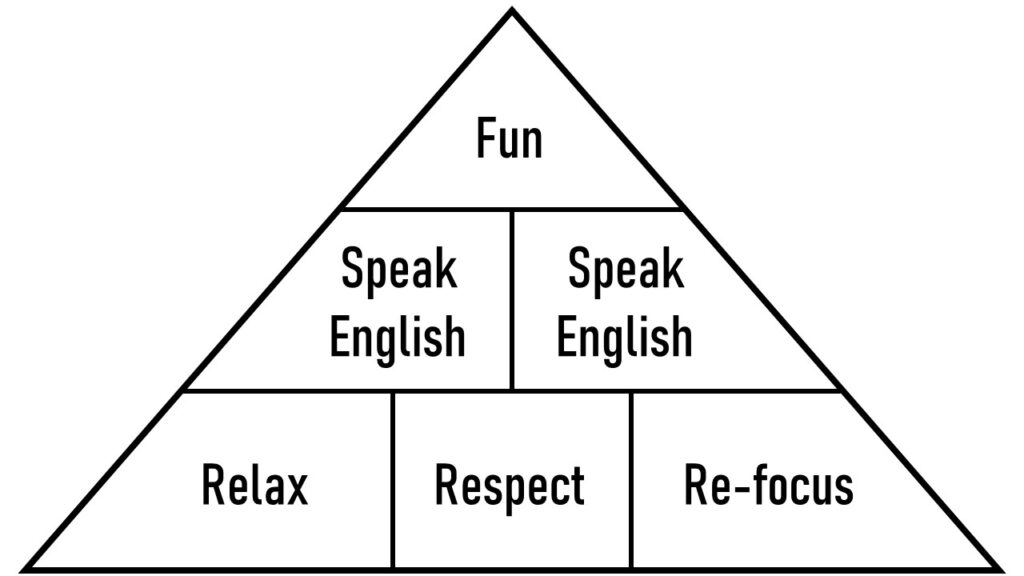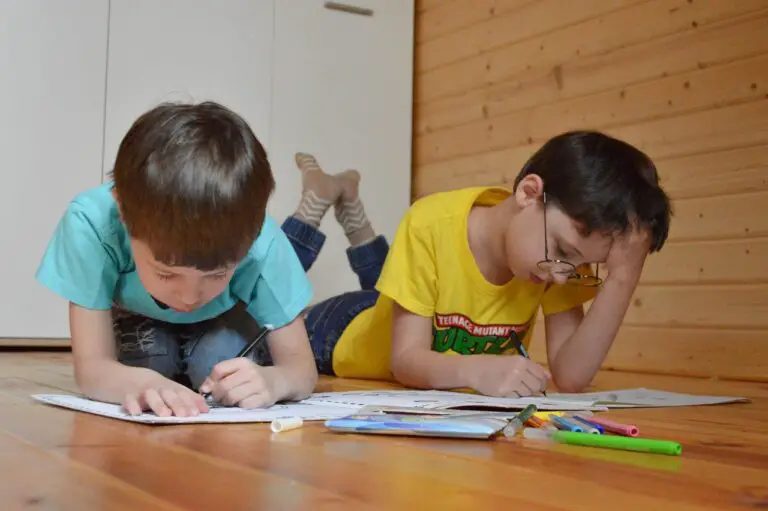Private EFL/ESL classes with children are different to lessons with big groups at school. You have the opportunity to explore activities which aren’t usually possible within the practical limits of a large class. There’s more room for creativity and students’ characters to shine.
However, despite the increased freedom, you still need limits. If you set the wrong expectations early on, you can have real trouble getting students to behave regardless of group size.

I’ve been through this. In the early days of private tutoring, I didn’t define those limits and got frustrated when small groups of kids, or even individuals, who normally behaved well at school were difficult to deal with. They were just as hard to manage as a big group.
I think sometimes private tutors forget the importance of establishing expectations. But it’s vital. And in this article, I’m going to share my best strategy, including the Perfect Pyramid.
But first, let’s look at what we mean by rules and expectations.
What are rules and expectations?
You could say the difference between rules and expectations is purely semantic. But I’d disagree. The words come with different intentions.
A set of rules suggests rigidity and conformity. They’re set by the teacher and followed by students and are usually direct and specific.
Expectations, on the other hand, are more general. They’re like principles to guide you rather than absolute restrictions.
Mostly, I favour expectations. I’m not against setting some rules, especially for non-negotiable behaviours, like no fighting, don’t draw on the table, etc. The thing is, those things are usually a given. They’re norms that almost all students abide by anyway, so you don’t need to lay them all out.
Expectations allow more flexibility and trust. They give agency to your students by letting them decide which actions fit within the expectations, rather than telling them exactly what to do all the time.
Here’s an example. You could set the rule: “Don’t talk while the teacher is speaking.” Sounds reasonable, right?
But do you want to enforce this rule in every situation? What if the student feels like they’re going to vomit? Would you rather they wait until you’ve finished talking for them to ask if they can go to the bathroom (possibly too late), or interrupt you? I’d rather they interrupted me and made it there safely.

And what about when you’re doing speaking activities in pairs or groups? If you’re helping one student, then you’d surely want the others to be talking to each other at the same time.
So there are times when the rule “Don’t talk while the teacher is speaking” doesn’t apply. It wouldn’t make sense to follow it all the time.
That’s why I use expectations like “respect the teacher and your classmates”. That would include not talking while the teacher is explaining something, but it would allow common sense to prevail. Students can make their own decisions as long as they follow the general principle.
The Perfect Pyramid of expectations
Now we’ve worked out what “expectations” are, how can we establish them in our classes?
It’s crucial you do this as early as possible, ideally in the first class. Not only that, but you need to remain consistent throughout all the subsequent lessons, otherwise things can quickly go off the rails.
What we need is a simple, clear, and visual reference. Something you can introduce at the start, which everyone will understand, and that you can revisit when needed without having to explain it all from scratch.
Fortunately, I’ve already created such a tool. It’s called the Perfect Pyramid. Here it is:

I like to draw the pyramid, revealing each section in turn, building from the bottom, the core principles, and rising to the top. First, let’s look at the bottom row.
The core principles: Relax, Respect and Re-focus

I start my explanation with Respect. It’s something I demand from every student in every class. Hopefully, your students will already understand the word. If not, it’s definitely worth going into detail about what it means. Maybe even translate it into their own language.
Get your students to give examples of what respect is about. This is where you’ll get things like “don’t talk while the teacher is explaining the activity”, “be kind to your classmates”, and “ask the teacher before going to the toilet”.
It should also include respecting the environment. Most private classes take place in somebody’s house, so it’s important to respect their space and privacy.
Next up is Relax. This doesn’t mean put your feet up and take a nap. Far from it. I expect all my students to work hard. Instead, this is about the atmosphere you want to create with your students.

You want trust, support and encouragement. Students should be able to practice their English without fear of mockery, punishment or getting a bad grade. They should relax and let the language come freely.
This ties in with Respect. You can’t feel relaxed if others in the class aren’t respecting you. If your classmates laugh make a mistake, that’s going to damage your learning and confidence.
The final core principle is Re-focus. Things will probably get a bit wild and silly during some classes. There will be games, role plays, shouting and dancing. A lot of excitement.
But none of this is possible if students can’t re-focus afterwards. If they’re unable to control their emotions and energy levels, you can’t trust them to take part in such fun activities.
The second level: Speak English and Speak English

No, this isn’t a mistake. It’s a deliberate choice aimed at reinforcing a point and adding a bit of humour to the expectation-setting process.
To learn English, students need to speak it. It’s as simple as that. You don’t become a great musician without ever picking up the instrument. Speech is the instrument of language.
That means students, no matter what their age and level, should always try to speak English. Of course, you can’t expect perfection. But confidence and motivation will be higher when you have the three core principles in place, especially Respect and Relax.

And if students aren’t speaking English, then they should look at the neighbouring principle – Speak English.
My students think this joke is hilarious and some of them even bought me a water bottle with the sentiment written on it. But, more importantly, it’s memorable. And to be fair to them, they always try their best to say everything in English, even if it’s really hard.
The apex principle: Fun

The best classes are fun. They create positive feelings and memories which are associated with the content of the learning, embedding it deep into students’ minds. Emotion is powerful. And fun creates motivation for further learning. If students want to be there, they’ll learn so much more.
For a deep dive into creating positive experiences, check out my article on how to do it in the context of learning vocabulary: How to Teach Vocab in EFL/ESL with Memorable Moments.
That’s not to say all fun classes are good. In fact, I’ve seen plenty of lessons in which students are having a great time but aren’t actually learning anything. Either they’re cheap, easy activities which the teacher does just to please the students, or they’re missing some of the other principles in the pyramid.
The way I explain this to my students is that if they meet all the expectations below (Respect, Relax, Re-focus, Speak English and Speak English), then we can do lots of amazing, exciting and powerful activities.
However, if they’re unable to do that, we’re limited in what we can do. The other principles come first.
There’s a promise here. A promise to your students that the classes can and will be enjoyable provided they do their part. What better motivation to behave? It also leads neatly on to setting expectations of what the teacher will bring to the class.
Expectations for the teacher
This is often overlooked, but don’t skip it. Telling students what they can expect from you shows them you’re also working to make the class as good as it can be. It’s only fair, right?
What’s more, the expectations for the teacher are almost identical to those of the students. You can use the same Perfect Pyramid.
In brief:
- The teacher will Respect all the students’ needs and desires, and will treat them fairly and kindly.
- The teacher will Relax by not getting angry unnecessarily. They will also create a supportive and encouraging atmosphere by never mocking or punishing those who try hard.
- The teacher will help Re-focus the class and keep control of their emotions and energy.
- The teacher will Speak English at all times.
- The teacher will Speak English at all times.
- The teacher will do their best to make classes Fun and engaging, taking into account the students’ likes and preferences.
The effects of saying this to your class is profound. You portray yourself as a human, just like them, and you show them you’re all working together. Too often it seems like students and teachers are on opposite teams. Not in your lessons.
Consistency is key
Behaviour management is a massive topic. There’s no way I can cover all the different perspectives and approaches in an article of this length. Teachers have their own styles and methods. And often they’ll disagree on the best way of handling a class. What I’ve suggested above is just my way of doing things.
But there’s one thing I’ve learned which can be applied universally. Consistency is key. Whatever rules or expectations you set, whatever rewards and punishments you might use, success will only come if limits are clear and stable.
Above all, students like to be sure of what they can and can’t do. That’s why setting out the expectations early is so important. But if you flip back and forth and react differently from one week to the next, your students will get confused and frustrated.

I’m sure you’ve all experienced a teacher who lets a minor misdemeanour go unpunished one day, but the next they yell at someone for doing exactly the same thing. It’s stressful and breaks trust.
In contrast, you may remember a teacher who you really respect but was extremely strict. Punishments were tough, but applied the same way every time. You quickly learned what was acceptable, and lived in the security that you’d be fine as long as you didn’t cross the line. That’s being consistent.
But how do you stay consistent in the long term? What do you do when students behave badly or don’t meet the expectations you’ve set?
Dealing with very bad behaviour
I’m not one for punishments. I don’t like creating negative experiences for my students, and often punishments don’t have the desired effect.
However, there are some things that must be dealt with. Violence, upsetting other students, breaking other people’s property, etc. These are all unacceptable.
To handle these clear-cut issues, your best resource is the students’ parents/guardians. During the class itself, there should be at least one parent/guardian nearby to deal with any issues.
I never have classes with kids under 16 without a parent (or other adult relative) in the house. In the rare case there’s nobody around, deal with the situation as best you can and speak to the parent(s) later.

Hopefully, the parents/guardians will be able to deal with the behaviour problem, and next class things will get better. However, this doesn’t always work. Sometimes parents can’t control their children’s behaviour, and problems will continue to arise.
It’s tough. Unfortunately, there isn’t much else you can do as a teacher on your own. In school, there’s senior management and systems in place for dealing with this kind of thing, but in private classes, you don’t have that luxury.
You only really have two options. First, try to connect with the student on a deeper level. Work out why they’re behaving badly. Is it because they’re bored of the class, stressed by the location, or uncomfortable around their classmates? Explain why you want to help them, and try to figure it out together.
That’s no easy feat. Expert psychologists make their living trying to do that, and it doesn’t always work.

Your other option is to remove the student from the class. If they’re constantly disruptive, it’s obvious they don’t want to be there, and, to be honest, you don’t want them to be there either.
Of course, warn the parents beforehand. Give the student a chance to improve rather than just kicking them out with no advance notice. Consider a three strikes and you’re out approach.
For the good of other students in the class, for the parents’ wasted money and for your own sanity, sometimes it’s better to call it quits and move on.
If you’re having trouble with reluctant students, I’ve written a whole guide on how to get them onside. Read it here: What to Do if Private EFL/ESL Students Won’t Participate.
How to reinforce expectations
Aside from overtly bad behaviour, there are other things that can go wrong in your classes.
Students can start losing focus, dropping their levels of respect towards you and others, and failing to speak English when they should be. This usually happens gradually, without you realising, like the proverbial frog in boiling water.
To avoid the the decline before it starts, do these two things:
- Highlight any minor discrepancies when they arise and relate them to the Perfect Pyramid. For example, a student says something in their native language rather than in English. Call them out and refer to the second row of the Pyramid. Consider having the Pyramid picture visible during the class.
- Have occasional review and reminder sessions. This is probably best every 3-4 months, at the start of each term. Go over the principles so students remember what they are and know will consistently reinforce them.
Sometimes, things will drop off anyway, and you need to take action. The best way to remedy the situation is to go over the principles once again and highlight where they’re falling short. A great idea is to get your students to think about where they’ve been failing.
Don’t approach it like you’re telling them off. Keep up the idea that you’re all on the same team and you’re trying to help them reach their potential. Consider it like a half-time meeting in a sports match when you’re behind on the scoreboard and need a pep talk to get back on the same page.
Conclusion
Behaviour management shouldn’t be a major worry for most private EFL/ESL lessons. Ideally, your students will want to be in class with you, so they’re motivated to behave well and learn as much as possible.

Some kids there because their parents are forcing them to attend. That’s normal. And you may experience behavioural issues with some. Use the Perfect Pyramid and enforce it consistently so they feel comfortable with what they can and can’t do.
And go one further. If you have students who don’t want to be there, do everything you can to make your classes something they can begin to enjoy. Of course, don’t sacrifice the integrity and quality of your teaching, but try to appeal to them. If they’re engaged with your lesson, chances are they’ll behave better.
Crafting enjoyable, powerful lessons is the art of teaching. This article is part of a series of guides that aim to help you do just that.
Follow the links below to learn how to be the best private EFL/ESL tutor possible.
Ultimate Guide to Giving Great EFL/ESL Private Classes
Needs Analysis for Private EFL/ESL Lessons: 12 step guide
Principles of Designing Amazing Private EFL/ESL Lessons
Acing Your First Private EFL/ESL Class: 9 Steps to Success
Lesson Plans for First Private EFL/ESL Lesson (+ tips)
How to Set Rules & Expectations in Private EFL/ESL Classes
What to Do if Private EFL/ESL Students Won’t Participate
Getting EFL/ESL Exam Preparation Right: Tips for success
Give Amazing Private EFL/ESL Classes to Kids: 9 steps
7 Steps for Incredible Private EFL/ESL Conversation Classes
Teaching EFL/ESL Grammar: A guide for private tutors
5 Tips for Setting Homework in Private EFL/ESL Classes






